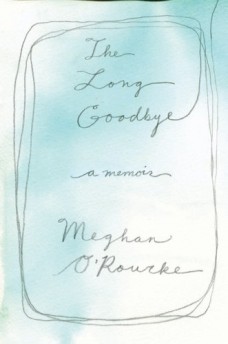 Reviewed:
Reviewed:
The Long Goodbye by Meghan O’Rourke
Riverhead, 320 pp., $25.95
Though death is the most common experience, memoirs about coming to terms with it make for illicit reading — their authors share personal stories about their own impending death or losing a loved one, and we devour the pages, hoping for some insight about our own inevitable end. Meghan O’Rourke’s The Long Goodbye, a memoir about losing her mother, is one of several books about grief that have followed in the footsteps of Joan Didion’s The Year of Magical Thinking, but it veers off in its own oddly comforting direction.
O’Rourke’s mother was diagnosed with colorectal cancer in May 2006, which initially went into remission after a round of “industrial strength chemo” just two months later. But when the disease returned in October 2007, there was little the medical community could do for her. As her mother’s health declined, O’Rourke’s thoughts turned to her own mortality: “The idea that I wouldn’t exist terrified me. I imagined it as being buried alive, a senselessness that could nonetheless be felt.”
O’Rourke mourns not only her mother’s life, but the part of her own identity that slipped away along with her: “One of the grubby truths about a loss is that you don’t just mourn the dead person, you mourn the person you got to be when the lost one was alive.” She emphasizes what it means to lose her mother specifically: “I was irrevocably aware that the Person Who Loved Me Most in the World was about to be dead.” In spelling out these revelations that we rarely discuss in society (I will be dead, I no longer have a mother), O’Rourke articulates the brutality of loss.
O’Rourke is a poet — the former poetry editor of The Paris Review and the author of Halflife, a book of poems — and only occasionally do her metaphors get the best of her. There’s one about searching through a drawer full of silverware in sunlight, and another when the ruined buildings of Detroit remind her of “the paradoxical wealth that comes with emptiness,” that are overwrought. Her strength rests in discerning which events in her own experience can help communicate to the reader the helplessness that comes from losing a loved one. One day, while she backed her mother’s car out of the garage, her father “just watched, in disbelief, as I drove it straight into his car . . . he didn’t wave me to stop, as if nothing could be done to prevent the impact he saw unfolding before his eyes.” In reading The Long Goodbye, we realize there is no “grieving process” — only a spontaneous, meandering sorrow that renders us helpless in its wake.
The most impressive, devastating moment of the book is the moment of her mother’s death — which O’Rourke recounts in detail. After reading this, phrases like “she died” and “she passed away” feel less adequate than ever. How often do we stop to think of that last breath? It’s too horrifying and too final. “I miss her hands,” O’Rourke writes, “which I shall never see again, for we have burned her body into fine, charcoal ash and small white bones, and that is what is now left of her voice and her eyes and her fingernails.”
O’Rourke’s bravery makes The Long Goodbye more than a beautifully written, compelling memoir. It is a useful book, one to recommend to friends who have lost someone; but only after they’ve had some time to tend to the wounds that will never fully heal.
Jessica Ferri is a writer living in Brooklyn. You can visit her online here.
Mentioned in this review:

